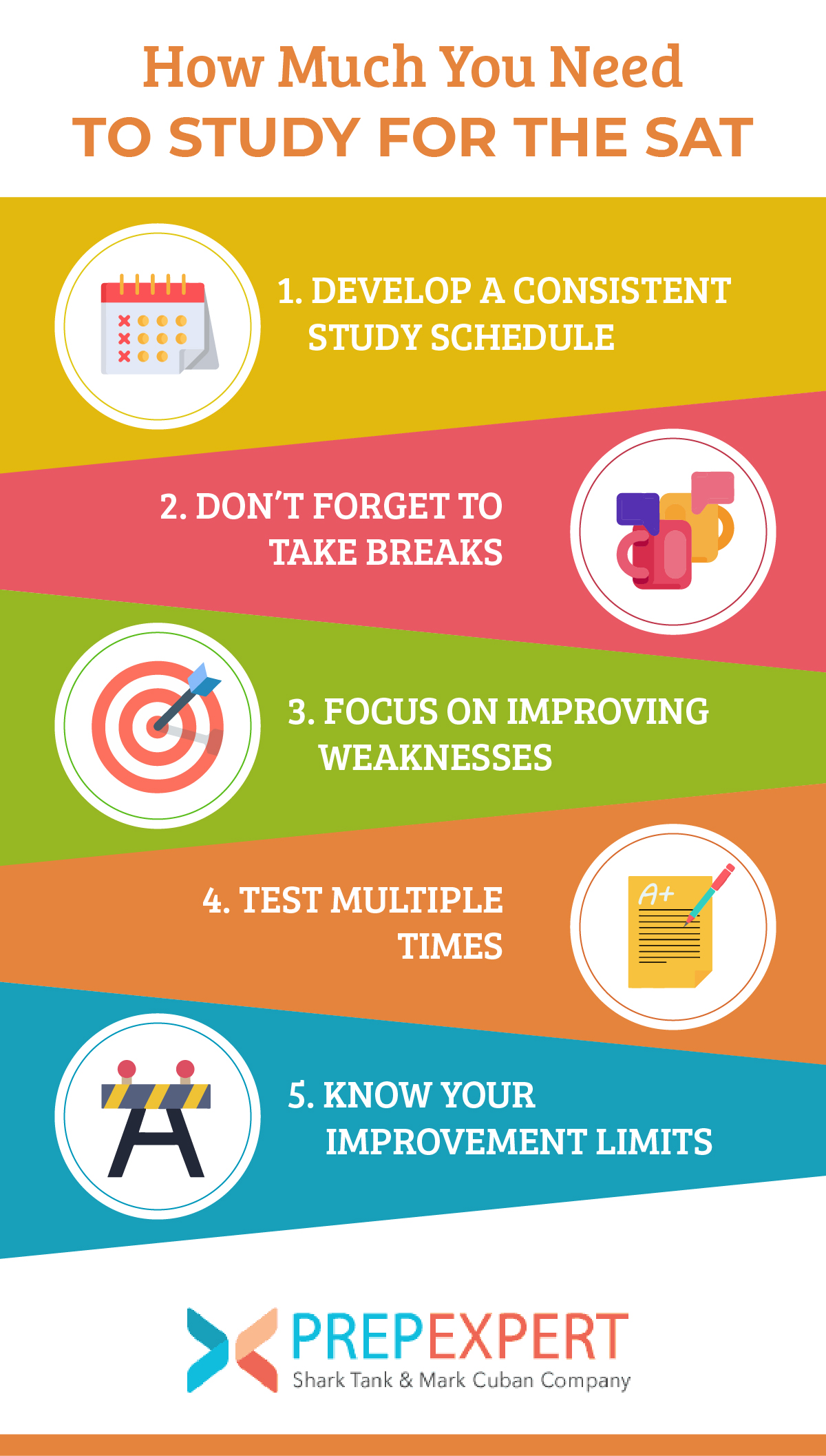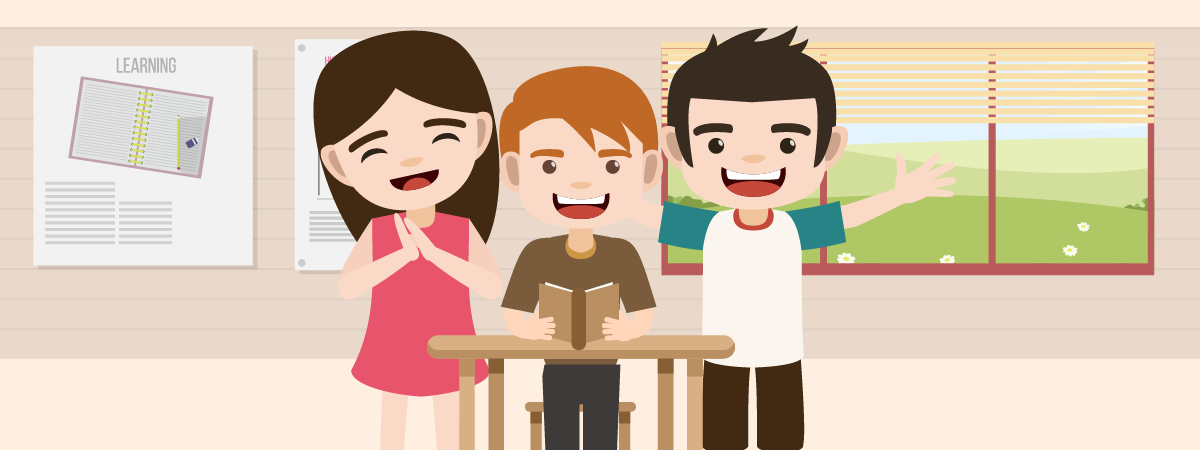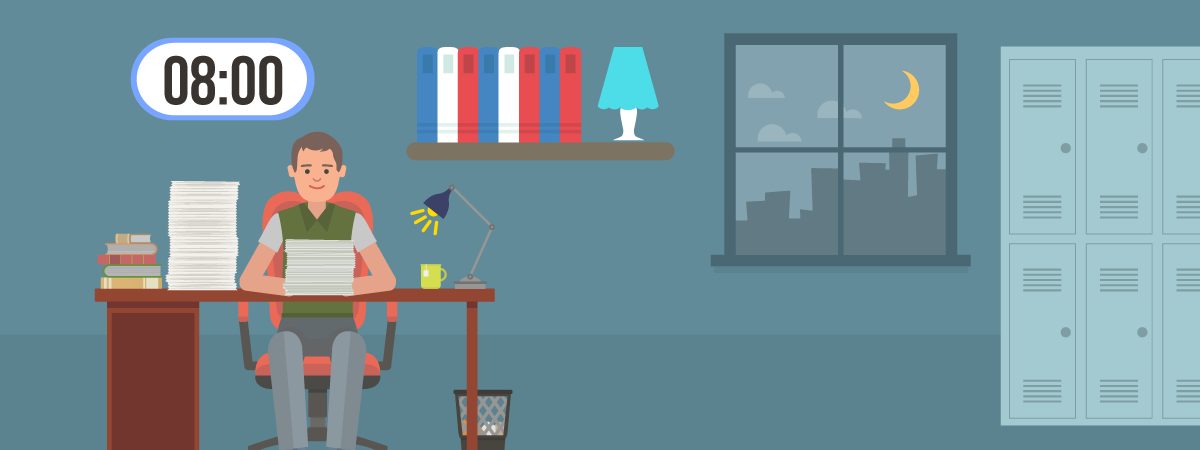How Much You Need To Study For The SAT
The SAT isn’t an exam you can cram for and do well; it requires lots of preparation. You need to become familiar with it—the types of questions asked, what right and wrong answer choices look like, how you need to pace yourself to finish on time, et cetera—to do your best.
You should study for the SAT every day over the course of a few months – make the test your biggest priority after family and schoolwork, and study on a consistent schedule. You should also take timed practice tests on a weekly basis.
This is your formula for SAT success. If you’re looking for help with the exam, check out Prep Expert’s SAT prep course. More on the ideal course of study below.
[sat_one]


Develop A Consistent Study Schedule
You need to study consistently over several months, in order to do your best on the SAT.
It’s best to study for the SAT over the course of months, rather than weeks or days. During this period of time, studying should be a big part of your life – right behind family commitments and academics. The exam needs to come before everything else—extracurricular activities, athletics, friends, and (sorry!) fun.
This means that you need plenty of time in your weekly schedule for SAT study. It’s ideal if you can find a consistent study time, say, 5-7 pm on weekdays, and 11-2 on weekends. Having a consistent schedule will help you remember when your SAT study time is, and make you likely to stick with it.
If you can’t keep a consistent schedule, then find the free times in your weekly schedule and study. It’s possible your schedule is already overloaded with extracurricular activities, in which case you might have to temporarily let go of a few of these pursuits. Model UN eating up your Saturdays? Put it on hold until after you’re done with the SAT.
The same goes for sports. Soccer requires a lot of weekend travel and long afternoons after school? Let that go, too—at the end of the day, your test score is much more important to college admittance than sports and extracurricular activities. If you do well on the test, you can resume whatever extracurricular activities you’ve given up during your junior or senior year.
If you’re a senior, then you have precious little time left to put in some serious SAT studying, so you’ll just have to put all other commitments behind you and focus. An ideal study schedule includes two to three hours of test prep, every day of the week. Remember, this commitment is only for a few months.
Now, it might not be possible that you can do two hours per day. If not, you should try for at least one hour every day. You should try to study as many days of the week as possible—a consistent and rigorous schedule allows you to gradually improve your test knowledge, leading to consistent improvement, and preventing you from forgetting important concepts.
[sat_two]
You will also need extra time once a week to take a timed practice test. Studying for the SAT is like a marathon, not a race: you want to be fully prepared for test day, and know what it feels like to sit for the entire exam. When taking the practice tests, make sure you replicate exam day conditions by studying in a quiet place that is free of distractions.

Be Sure To Take Breaks
Take a ten-minute break for every hour of studying. It will give your brain a much-needed rest, and preserve your stamina and focus.
Taking a ten-minute break gives you time to eat something, use the restroom, check your texts, Facebook, or Instagram, et cetera. Knowing that you will have time to do these things will allow you to focus more during your study time: “If I work hard, I can reward myself with a break.”
Remember that if you’re sitting for a full practice test, you should take breaks based on the schedule used on test day. These are different than the ten-minute breaks suggested here. You can find the SAT break schedule on the College Board website.

Spend Your Time Wisely—Focus On Your Weaknesses
Keep a log of what types of questions you’re getting wrong, then focus on them.
There will almost certainly be a pattern in the types of questions you’re getting wrong, as well as in the content areas you need to work on. For example, you might need to review comma usage rules, reacquaint yourself with systems of equations, or work on vocabulary-in-context questions.
Once you know your weaknesses, you should commit to focusing on them during a portion of your set-aside SAT study time. If you’re finding it difficult to re-learn some of these things on your own, or need strategies to do better on the types of questions you’re getting wrong, it would be a good idea to sign up for an SAT prep class with Prep Expert.
Prep Expert offers classes throughout the country, throughout the year, every day of the week. It also offers online classes, with an On-Demand feature that allows you to watch classes you missed, or couldn’t make due to other commitments, anytime you want. In addition, Prep Expert offers one-on-one tutoring, both in-person and online, as well.
Prep Expert classes and tutoring provide you with the strategies you need to improve your score. Thousands of students have seen substantial score increases using Prep Expert’s methods. What’s more, our instructors, all of who scored 1600 on the SAT, can help you get up-to-speed and re-learn all those things you forgot from your Math and English classes.

Unhappy With Your Score? Keep At It.
Be ready to take the SAT more than once. Most students score higher after re-taking the test once or even twice.
There are major benefits to taking the SAT more than once. Sitting for the exam the first time gives you experience with real test-day conditions. These conditions often create considerable anxiety, which can have a big effect on your performance.
In addition, most students, after they get back their first score, know that they can do better with just a little more preparation. So, don’t consider the first time you take the SAT your last time and don’t give up studying after you’ve taken it, either.
Instead, wait for your score report to come back, and take a look at the types of questions you got wrong. Now you have a rock-solid, reliable idea of where you need to do more work. Use this information to recalibrate your study plan, and adjust the amount of studying you’re doing.

Happy With Your Score? Congrats, You’re Done!
When you’ve reached your target score, you’re finished studying for the SAT. Congratulations!
You’ll know you’ve studied enough for the SAT when your score report comes back and you’ve reached or exceeded your target score. Pat yourself on the back, and put those sports and extracurricular activities back on the calendar.
[leadmagnet_two]
The right target score differs from student to student. Your target score might be one that you need to be competitive at a particular college or university you’re applying to, or it might be the score requirement for a scholarship you’re applying for. Or, perhaps you’re looking to balance a less-than-stellar GPA, and so you’re aiming for the highest test score possible.

Know Your Limits—There Is Such A Thing As Too Much Studying
Don’t work yourself to the bone, if your score has stopped improving after lots of committed studying.
Know when to call it when you’ve worked incredibly hard, devoted countless hours to studying, and seen your score plateau, even if it’s a number lower than you had hoped. Not everyone can score 1600, after all, and it’s quite possible that you’ve done the best you can do.
There’s no reason to drive yourself crazy or wear yourself out in the maniacal pursuit of a higher score. Adjust your expectations, and draw up a list of colleges where your score is competitive. Keep in mind that a higher GPA can balance out a score that isn’t quite what you’d hoped. Don’t forget to pat yourself on the back for your hard work and commitment.
If you maintain this positive attitude throughout the next few years, you’re definitely going to have a very valuable college experience. Hard work, even more than intelligence, is what it takes to be a successful college student.
[sat_three]
For more test strategy, college admissions, and scholarship application tips sign up for our FREE class happening right now!
How Much You Need To Study For The SAT FAQ
How long should you study for the SAT?
It’s best to study for the SAT over the course of months, rather than weeks or days. During this period of time, studying should be a big part of your life – right behind family commitments and academics.
What’s a good studying schedule to keep?
It’s ideal if you can find a consistent study time, say, 5-7 pm on weekdays, and 11-2 on weekends.
What else should I do when studying for the SAT?
You will also need extra time once a week to take a timed practice test. Studying for the SAT is like a marathon, not a race: you want to be fully prepared for test day, and know what it feels like to sit for the entire exam.
How many breaks should I take when studying?
Take a ten-minute break for every hour of studying. It will give your brain a much-needed rest, and preserve your stamina and focus.